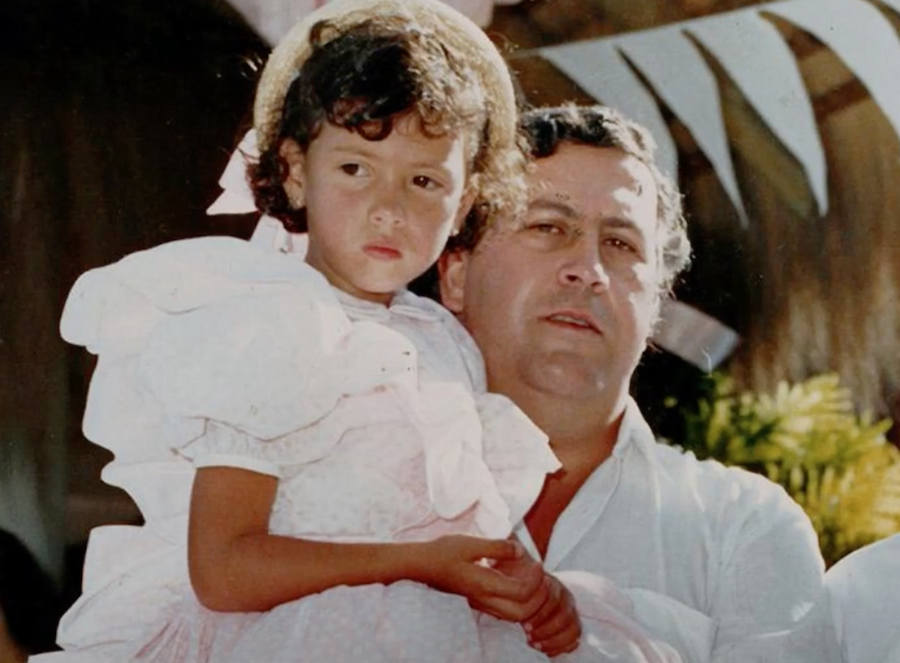Manuela Escobar: The Untold Story Of Pablo Escobar's Daughter
How does one navigate a life inextricably linked to the legacy of one of history's most notorious criminals, while remaining untainted by his crimes? Manuela Escobar, the daughter of the infamous Pablo Escobar, has lived this paradox, a life shadowed by her father's deeds yet defined by her own innocence.
Born in 1984, during the zenith of Pablo Escobar's cocaine empire, Manuela experienced a childhood of unparalleled luxury. She was the apple of her father's eye, showered with affection and material possessions. She even once expressed a desire for a unicorn, a testament to the fantastical world she inhabited. However, this gilded existence was shattered in December 1993, when Pablo Escobar was killed in a police operation in Medelln, Colombia.
| Attribute | Details |
|---|---|
| Full Name | Manuela Escobar |
| Date of Birth | May 25, 1984 |
| Place of Birth | Medelln, Colombia |
| Parents | Pablo Escobar (Father), Maria Victoria Henao (Mother) |
| Siblings | Sebastin Marroqun (formerly Juan Pablo Escobar) |
| Known For | Daughter of Pablo Escobar, a public personality. |
| Current Residence | Argentina (reportedly) |
| Education | Home-schooled |
| Career | Businesswoman, Homemaker (reported) |
| Controversies | Linked to the Escobar name and its associated history, faces continuous fear of retaliation from her father's enemies |
| Significant Events | Father's death in 1993, relocation to Argentina, change of identity |
| Current Status | Private life |
Reference: Information on Manuela Escobar is often derived from biographical accounts and media reports focusing on her family's history. Unfortunately, comprehensive, verified information about her is extremely limited due to her preference for a private life.
The death of the notorious drug lord brought an abrupt end to an era of violence and drug trafficking that had plagued Colombia for years. For Manuela, it marked a dramatic turning point. The opulent lifestyle she had known vanished, replaced by an existence defined by fear and the need for secrecy. The family was forced to flee Colombia, seeking refuge in Argentina in 1994, where they changed their surnames to Marroqun Santos to distance themselves from the Escobar legacy. Manuela began a new life. Her mother and brother adopted new names as well.
Despite her clean record, Manuela has never been able to fully escape the shadow of her father's atrocities. Articles about her are dated and scarce, often reflecting on her connection to her fathers past. In 2015, it was revealed that Manuela lived in continuous fear of retaliation from Escobars enemies, a chilling reminder of the danger that still clung to her family. She had earlier suffered from bouts of depression and had even attempted suicide, the weight of her legacy proving too much to bear at times.
Her brother, Juan Pablo Escobar Henao, who became an architect and author, also changed his name to Sebastin Marroqun. Together with his mother and sister, they sought to create a new identity, free from the stigma of their past. However, the past has a long reach. In 1999, Manuelas mother and brother were arrested in Argentina for forging documents, money laundering, and other illicit activities, a stark reminder of the entanglements that remained.
The Hacienda Npoles, a sprawling estate built by Pablo Escobar in the 1980s, stood as a monument to his wealth and power. It has since been expropriated by the Colombian state from Escobar's family. It once boasted a zoo with exotic animals, a replica of the Flintstones home, and a private airfield. It symbolized the excesses of Escobars life and the immense impact he had on Colombia.
Manuelas early life was a testament to her father's love and the extraordinary resources at his disposal. She was given a unicorn, which is technically impossible but sort of feasible if you're evil. Pablo Escobar lavished gifts upon her, ensuring she lacked for nothing. She received education at home, sheltered from the outside world, further isolating her from the ordinary experiences of childhood. This unique upbringing, while luxurious, also contributed to her later isolation, and the challenges she would face in building a new life.
Manuela Escobar is a public personality and has been described as a Colombian businesswoman and homemaker. However, information on her current business ventures is scarce. The details of her daily life remain largely unknown, by her own choices, shielded from the public eye.
Manuela Escobars story is a complex study in identity, survival, and the enduring power of family history. Her existence poses questions about responsibility, guilt, and the possibility of redemption. The weight of her father's actions, the constant threat of retribution, and the struggle to establish a life separate from her family's past continue to shape her journey.
While her brother, Sebastin Marroqun, has written and spoken extensively about their experiences, Manuela has largely remained silent, preferring to live a private life. This silence has further fueled public curiosity and speculation.
The media has shown some interest in manuela's story, but most of the articles and interviews about Manuela are limited. Her story reminds the world of the complex relationships between family members involved in criminal activities.
The challenges faced by Manuela Escobar are a reminder of the long-lasting consequences of the actions of Pablo Escobar, not only on the people who were directly hurt by him, but also on his family, who were dragged down by his activities. Manuela's life is a testament to her resilience and her desire to create her own way.
The story of Manuela Escobar reveals a lot about the price of crime. Her struggle to move away from the shadow of her father is a reminder of how the actions of the father can affect the rest of the family. Her journey is an example of how she wanted to live a normal life.
Manuela Escobar's story is an exploration of the challenges of family, loss, and seeking an identity for yourself. Despite all her hardships, Manuelas story shows her strength and her drive for something different.
Manuela Escobar's story is a testament to the complexity of human experience. Her existence serves as a reminder of the enduring power of legacy, the lasting consequences of violence, and the human desire for a life beyond the shadow of a troubled past.
Manuela's experience has shown the world how trauma can affect children in family when one is involved in crime. It also highlights her struggles with mental health, emphasizing the need to address these issues.
Manuela's story reminds us of the ripple effects of crime, impacting not only those directly involved but also their loved ones. The difficulties she faced emphasize the importance of support and understanding for family members.
Manuela's choice to live a more private life reflects her attempt to establish her own identity. Her actions reveal her hope to build a life separate from the legacy of her father, offering a unique look into the challenges of starting anew.
Manuelas tale reflects the long-term results of criminal actions on family. She is a reminder of how challenging it can be to create a new life in the face of hardship.
Manuela's story offers a glimpse into the human condition. The choices she has made show her drive to find her own path, inspiring a new life filled with personal strength.
The case of Manuela Escobar highlights the human need for stability, particularly in the face of fear. Her actions demonstrate her will to escape the shadows of her past, and her determination to build a life of peace.
Manuela's story is an examination of resilience, identity, and the lasting impact of family. Her decisions highlight her determination to build her own future. It is a story of hope and determination.
Manuela's narrative is an insight into the long-term consequences of a criminal lifestyle. She reminds us of the significance of seeking personal peace and finding an individual identity.
Manuelas story also highlights the significance of getting help for people in difficult circumstances. It encourages empathy and provides insight into navigating life's complexities.
Manuela Escobar's story is a testament to the enduring complexities of the human experience. The account demonstrates the lasting impact of family, crime, and her search for peace and identity.
Manuelas life offers a view into the psychological impact of crime and violence, as well as her resilience in facing these challenges. The details demonstrate her drive for a private life.
The journey of Manuela Escobar is a reminder of the importance of resilience, self-discovery, and family in confronting life's adversities. It shows her desire for an identity of her own.
The case of Manuela Escobar reveals a lot about the challenges one has to overcome when a family member is involved in a criminal activity. Her experience underscores the necessity of self-reliance.
Manuela Escobar's story is about overcoming adversity and seeking personal identity. Her decisions highlight the power of forgiveness and the search for a peaceful life.
The story of Manuela Escobar is a reminder of the ripple effect of crime and violence and the enduring legacy. Her experiences are a strong example of the human drive for self-determination.
The story of Manuela Escobar serves as a reminder of the significance of family, resilience, and the quest for identity. Her life is a symbol of fortitude and a testament to the human spirit.
Manuela Escobar's story is a reminder of the far-reaching effects of crime and the difficulties of building a life that is your own. She is a testament to the strength of the human spirit.


